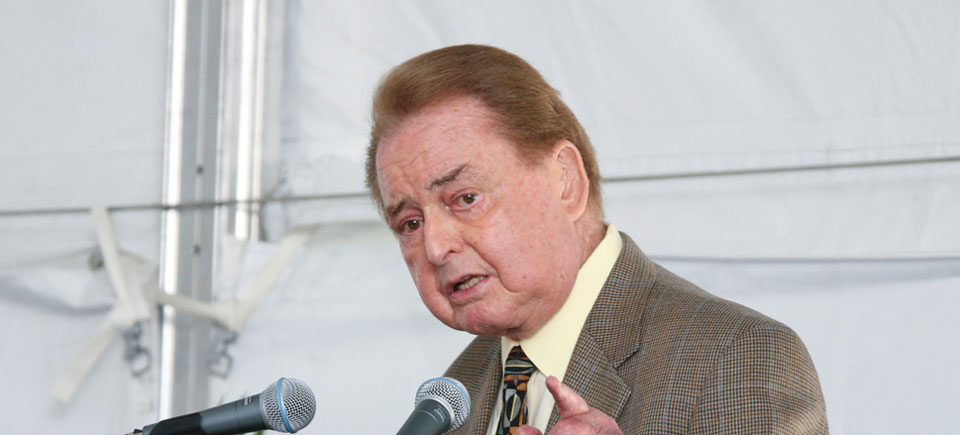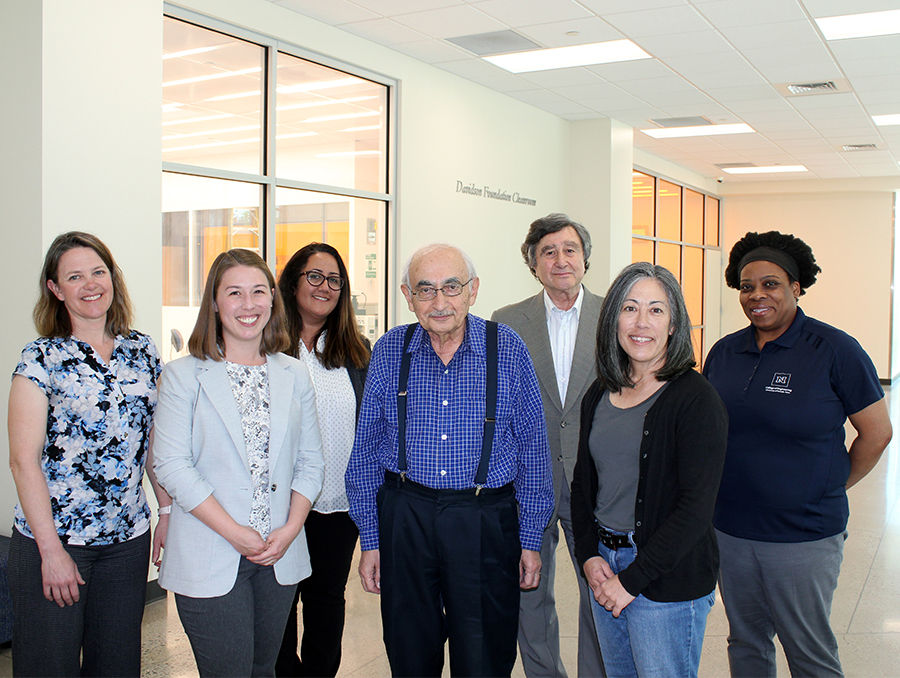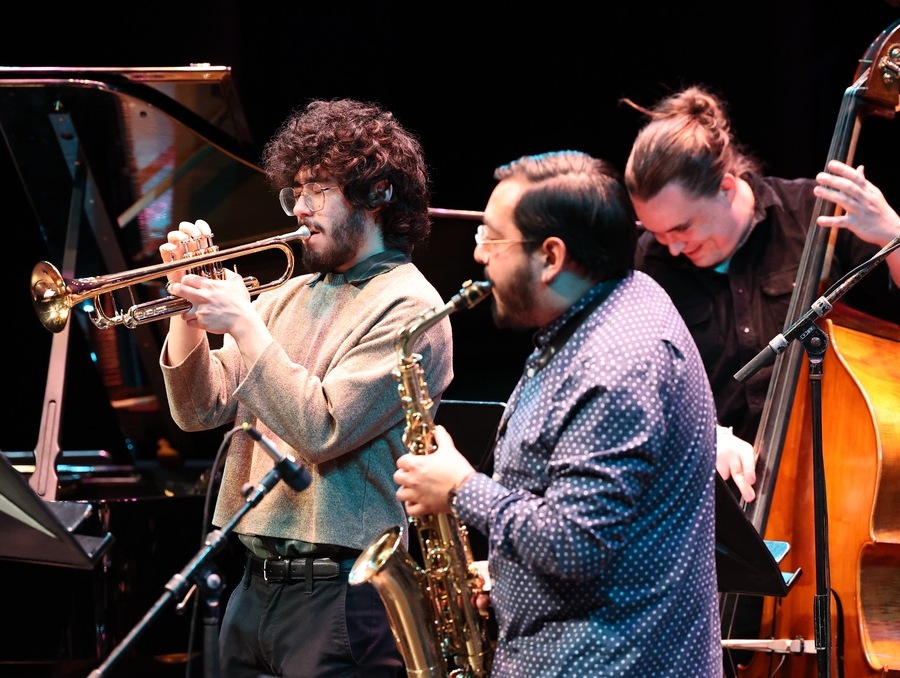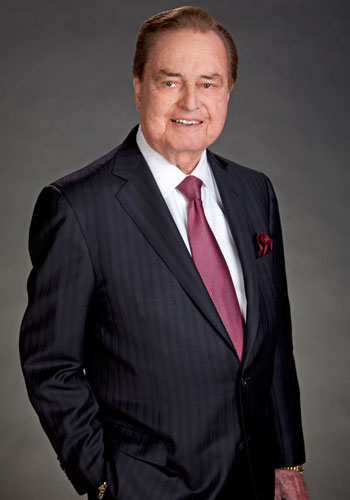
Senator William Raggio, 1926-2012.
Nevada State Sen. William "Bill" Raggio had a way of always eyeing the future and pushing his state toward its future, though he always did it through the scrim of the past.
He was the rare person who was as relevant and imposing in his 85th year as he had been half a century earlier.
When speaking, he could command a room in such a way that those who were supposed to follow his remarks did so at their own peril.
"I would shudder whenever I had to follow Bill," said Joe Crowley, University President Emeritus, on Friday morning, just a few hours after Crowley learned that Raggio, the longest-serving State Senator in Nevada history, had passed away on Thursday while on a trip to Australia at the age of 85. "No one could keep up with him in that area, or many others, for that matter."
Raggio, a 1948 graduate of the University, served in the Nevada State Senate from 1972 into early 2011.
There were few others who had a greater or more profound impact on the state, most particularly in supporting higher education.
Crowley, a former political science professor at the University, said Raggio's ability to embody the ideals of different era in America, a time when politics were not so partisan, helped pave the way for the fourth-generation Nevadan's success.
"Well, he's legendary," Crowley said, when asked to take stock of Raggio's career and its impact. "I think the contributions that he made were in part of his understanding of what, over the centuries, has helped make American politics productive in the long-term. There are times when we weren't doing this very well, and now is probably one of those times. But Bill had a very fundamental understanding that we are a nation and a state of tremendous diversity, in geography, religion, ethnicity, background. Therefore, the only way we can solve problems and meet challenges is to work together and that involves meeting in the middle of the road.
"Bill had a very strong commitment to that. He was able to use his mastery of the legislative process to do that. He was a consensus-builder in every way: Check your personal enmities at the door and let's sit down and do business. That was Bill's way. That was how he got it done."
What did he get done? The list is too long to list here, and Raggio, in his self-effacing, deadpan manner, would probably be embarrassed to have his many accomplishments listed here. Still, it bears noting that among his many accomplishments:
- Distinguished Service Award, awarded by the University of Nevada, Reno Alumni Association in 1997,
- Outstanding Alumnus, awarded by the University of Nevada, Reno in 1999,
- Jake Lawlor Award, awarded by the University of Nevada Athletic Foundation in 1999,
- President's Medal, awarded by UNLV in 2000,
- "Hero of Education" Award, awarded by the University of Nevada, Reno Faculty Senate and Nevada Faculty Alliance in 2011,
- Honorary Doctorate of Humane Letters, awarded by the University of Nevada, Reno in 2011.
- A permanent display devoted to Raggio is located on the first floor of the University's William J. Raggio Building. The 118,000-square-foot building is home to the College of Education. It opened for classes in fall 1997 and was renamed in recognition of Sen. Raggio's significant contributions to education in 2003. Within the building is the Raggio Research Center which promotes research and programs to support science, technology, engineering and mathematics education.
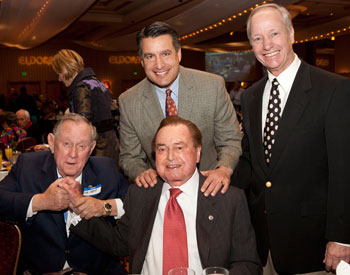
A gathering of Nevada political and athletic elite: Reno Mayor Bob Cashell, Nevada Governor Brian Sandoval, Wolf Pack Football Coach Chris Ault and Senator Bill Raggio.
As Crowley mentioned, Raggio's mastery of the legislative process was legendary. He could outthink and outperform and outlast just about any rival, even as his years advanced.
University president Marc Johnson still remembered the first time he had ever met Raggio.
"He very much lived up to expectations," Johnson recalled Friday. "Very much so. He really thought of higher education, and his alma mater. He was always willing to give counsel, to give advice, to share his perspective. Bill was incredibly wise."
In 2005, as the Nevada State Legislature plunged into special session while scrambling to close out the state budget, the process dragged on for nearly 24 straight hours. Legislators half Raggio's age - he was pushing 80 years old at the time - were hunched in the hallways, ties undone, scarfs askew.
As the night and the early morning hours dragged interminably on, Raggio would emerge from each meeting of his own caucus, as well as meeting with rival Democrats, like a splendidly plumed bird. His delicately cut suits did not have a single wrinkle. His hair was impeccably in place. The gold chain around his wrist bobbed with an air of supreme authority.
In the end, the budget passed. The sense in Carson City that morning, and for many other mornings like it when others wavered and Raggio seemed to gain strength and stamina with every passing hour, was that Raggio was only just warming up.
"During Bill's time, he mastered the end game like no one else," Crowley said. "Bill was legendary at bringing all that stuff together, all that stuff that was floating in the halls of Carson City, in the restaurants and the salons, and putting it together so at the end of the day, at the end of the session, it was all wrapped, with a bow."
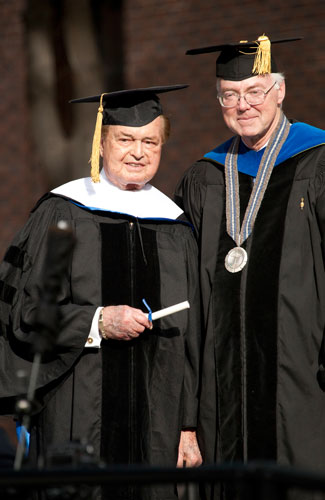
Senator Bill Raggio receives a doctorate of humane letters from University President Marc Johnson during the 2011 spring commencement.
When Raggio arrived in Carson City in 1972, it was not clear what the future would hold.
He had been on such a fast track through the late 1950s and 1960s, first as an assistant Washoe County District Attorney under another towering figure in the history of Northern Nevada, Jack Streeter, then as D.A. himself from 1958-70.
He became a fierce protector of what he viewed as "old Reno," the place where he had grown up as the only child of William J. Raggio, Sr., and Clara (Cardelli). Raggio's Reno was a law-abiding, sleepy little stop along the old Lincoln Highway.
His Valley Road neighborhood was a place where the lots were small and the houses were even tinier, a place where people were more apt to be part of each other's lives. It was a place that was free-flowing and friendly, where people wandered in and out of living rooms and kitchens and visited each other often. The isolation of cul-de-sacs and cold stucco and McMansions was long in the future.
"It was an uncluttered life," Raggio said simply during a 1999 interview in describing growing up in old Reno.
He grew up in a hopeful little home only about a half-mile from the University of Nevada campus.
In his excellent chapter on Raggio's career in Richard Davies' excellent book, "The Maverick Spirit: Building The New Nevada," Robert Dickens, director of governmental affairs for the University, noted that the University campus had served as young Raggio's "playground" - a place for a young person to frolic in a park-like setting, where the frogs in the ditches were plentiful and easy to catch, and where the students and faculty didn't seem to mind the young interlopers from the surrounding neighborhoods.
"To me, it was one of the most beautiful places I'd ever seen," Raggio recalled in 1999. "There's a great line from a poem, I think it was Masefield, who wrote that, there is nothing more beautiful than a college campus. The University campus was that place for me."
"Bill was certainly an excellent example of people who grew up near the University and actually used the University as their playground when they were children," Johnson said. "It's sort of the 'old Reno' that you hear about. Reno was a much smaller town then. The University was closer to the center of activities, in the residential part of town. And these folks would speak very lovingly about their memories of being on the University campus as children, not thinking of it as a University, but as a place to play. And as they grew, the University became their educational centerpiece. And they continued to come back as alumni, through social and alumni activities, and in the case of Bill, he continued to support higher education throughout his life.
"It's fun to talk to people like Bill, who are third- or fourth-generation Nevadans, and how they remember this place throughout their entire life."
After serving in World War II, Raggio returned to the University, graduating in 1948 with a degree in political science. He moved up the ranks quickly, serving as the lead prosecutor in the horrific murder of British Olympic skier Sonja McCaskie - he was named the top prosecutor in the U.S. in 1965 - and ran herd on pimps and prostitutes or anyone else who ran afoul of the law.
By 1970, Raggio campaigned - unsuccessfully - for U.S. Senate against the Democratic incumbent, Howard Cannon. Many thought the promise of Raggio's early career had been wasted, and the crusading handsome young prosecutor was finished.
The 1970 election and the loss had a profound effect on Raggio, and, in a roundabout way, changed the history of the University forever.
Crowley, who was a 1972 delegate for eventual nominee George McGovern at the Democratic National Convention, wasn't Raggio's greatest fan in 1970.
Raggio, during this time, had often been unsparing in some of his comments about the University.
"He and I had a bit of a difference in opinion during the course of the 1970 campaign," Crowley said. "It involved some of Bill's views of some of the activities, ongoing, on the campus. Those were tough times and the University, here as with many other universities around the country, became enmeshed in the troubles of the time: the student unrest, the student democracy movement, the civil rights movement.
"There was a lot of town-and-gown tension and Bill, at that time, felt he could offer some observations that were not regarded as friendly on the campus."
Crowley, in response to some of Raggio's rhetoric, was moved to write a letter to the editor.
"It was tongue-in-cheek about Bill," Crowley remembered. The reaction, he recalled, was very positive. Crowley began receiving phone calls from people on campus congratulating him for taking a stand against Raggio.
Crowley's campus profile grew; not long after publication of his letter to the editor, he was asked to join the Faculty Senate. Not long after he was chair of the Faculty Senate. In 1978, with many of his supporters noting that Crowley, though young, had great respect on the campus, was chosen as interim president and then president.
There were many other factors at play when Crowley was chosen as president, obviously, but the Raggio letter certainly didn't hurt.
In a testament to Raggio's personal flexibility and ability to often take a step back and see the big picture and to adjust accordingly, he and Crowley were soon working together to further not only the mission of the University, but of all of higher education in Nevada.
Years later, in 2001, Crowley, Dickens and Raggio were having lunch. The three were talking intently about that year's legislative session when, "Out of nowhere, related to nothing we had talked about to that point, Bill looked at me and said, 'That was not a very pleasant letter you wrote,'" Crowley said with a light chuckle. "Bill didn't say it in an accusatory way, it was more like a passing comment. By that time, we'd become fast friends and Bill had done so much for higher education and for his alma mater. He was certainly entitled to say something much more severe than he did. But that wasn't Bill's style. I will always remember that. He waited 30 or 31 years, and then in five or six words said what he felt needed to be said, and then moved on."
Then Crowley paused, perhaps remembering Raggio's sense of humor, which was just as legendary as his legislative skill.
"When he said those five or six words," Crowley said, "I said, 'Bill, I'm buying lunch.'"
While Raggio excelled in closed-door meetings, he was just as adept in public forums.
Only a few days ago, during a brunch honoring longtime Nevada Athletic Director Emeritus Richard Trachok and his wife, Fran, Raggio, by all accounts, had stolen the show.
"Bill was his masterful self," Crowley said. "Lord, there were so many times like that. There are people who are blessed with a great sense of humor and they are just like great athletes - it's just so natural, and it presents itself at every occasion.
"Even during the most serious business in Carson City, Bill would always find a way to incorporate that gift into the process. It had such a calming effect in moments of stress. He certainly had a plentitude of targets for that humor, and I was proudly one of them."
"He was one of the funniest people I've ever met," Johnson added. "He always would add the most humorous comments. Anytime he spoke, he always added humor. He was able to put audiences at ease, even though he was such a giant in terms of his reputation.
"He always made it possible to be approachable. Very approachable, very humorous ... and a very wise man. He was always humble. That's what I will always remember about him."
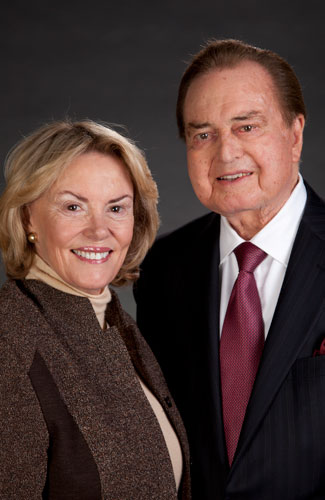
Dale and Bill Raggio.
Raggio faced his own share of tragedy throughout his life.
His first wife, Dorothy, passed away in 1998. His son, Mark, died unexpectedly in 2004.
He remarried, however, and together with wife Dale, the two made for a striking couple. Dale, with sunrise in her ever-present smile, became a fixture, always at her husband's side, at events throughout the state.
"Dale was such a delight for Bill," Johnson said. "They always showed up to everything, together. And they were just a real loving pair."
In 2011, upon retirement from the Senate, the testimonials and dinners honoring Raggio's life began in earnest, each one featuring the complimentary words, the contemplative moments, the plaques, the photos, and then the words from Raggio, which were often funny, and always memorable.
On Feb. 25, 2011, Raggio was honored by the Nevada Faculty Alliance and the Faculty Senate with "A Hero of Higher Education" award for his commitment and advocacy for higher education in Nevada.
A crowd of nearly 200 faculty, staff and students gathered at the Joe Crowley Student Union for the event.
In the days leading up to the event, Raggio had publicly stated that he believed politics in Nevada and throughout the country had become too partisan, that there was too much heated rhetoric and not enough measured cooperation.
As he stared out at the crowd, Raggio noted that he had come to his old campus under false pretenses.
"It was told it was a Tea Party convocation," Raggio quipped.
More seriously, in just a few minutes, he encapsulated well what his entire 38-year legislative career had come to represent. He said it was time for all legislative leaders to "take a step back, and take a deep breath. I would hope that others would develop some flexibility with this process."
The house on Valley Road, after an eight-minute walk from campus on this Friday morning, is just as you remember it.
It is still hopeful, still surprisingly small, which isn't a bad thing. It is not a place for anxious striving. It has a melodious, layered feel. All of the tightly built little homes here are so closely situated together, backyards run into other backyards like a continuous green, flowing river.
Nearby there are reminders of the Nevada of today. Heavy machinery groans monotonously, tearing up the east bound lane of Interstate 80. Black soil is upturned along with chunks of asphalt. Orange traffic cones peek over a concrete divider, looking like small soldiers peering up through the trenches as the west bound cars whiz by. The feel of progress is strong, and the scraping sounds of digging and pushing forward fill the crisp February air.
But not far from Ninth Street, the enclave of small homes that remain along Valley Road among the scattering of elm and pine trees harkens back to a simpler time, an uncluttered time, when families gathered on small porches like the one that stretches from the front of the home where young Bill Raggio grew up.
For a moment, the digging and the roaring of heavy machinery, the dust and diesel of the freeway's cars, seems to fade.
Instead, the chirping of birds can be heard. The chirping then gives way to voices as your eyes close. The voices of parents can be heard. They stand on front porches, eating pie and drinking strong coffee and laughing, their children playing in the small, immaculate yards that stretch from one of the little homes to the next.
And then, in the mind's eye, a young boy appears. He quickly cuts across the Union Pacific Railroad tracks, an empty mason jar for pollywogs in one hand, a turkey and provolone cheese sandwich wrapped in wax paper in the other.
He has a busy day ahead of him. The boy will find his way to the University of Nevada campus.
And soon, very soon, that University campus, and the state it serves, because of the boy and his uncanny ability to constantly forge forward while never forgetting what is in the past, will never be the same again.
